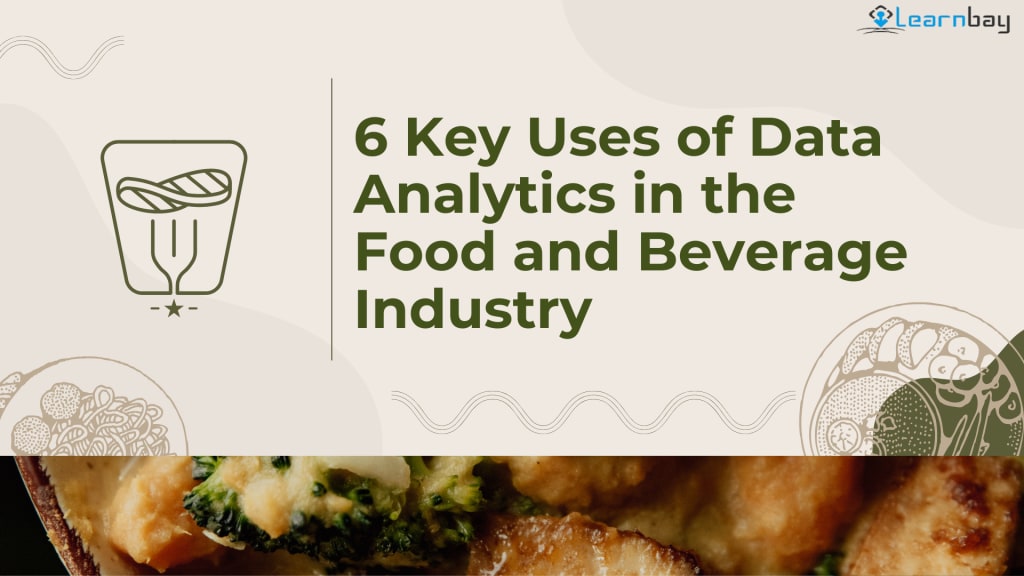
Beer is important at RapidMiner. We were established in Germany, and most of the staff at our headquarters in Dortmund are researchers engaged in grant-related projects with organizations like the German government.
Given that we have German heritage, it should be no surprise that our research team is interested in discovering how machine learning may benefit breweries. In this blog article, we'll look at some of the most useful machine learning use cases that have been created to help with difficult beer production and distribution processes, as well as how they might be used more generally in the production of food and beverages.
Data Science in Beverage and Food Manufacturing: 6 Key Use Cases
The study group has discussed more than 40 benefits of machine learning for brewers. The work on "data-driven process optimization in the beverage industry based on machine learning" has given rise to six projects, which we'll highlight in this article. As you will see, these projects address a wide range of food and beverage and general manufacturing challenges, even though they were created expressly for breweries.
Estimating wait times and truck arrivals
You could be mistaken in thinking that breweries have a mechanism to coordinate supplies to wholesalers, at least in Germany. It's not unusual for a distributor to arrive unexpectedly at a brewery and request a whole truckload of beer. These surprise arrivals make it challenging for the brewery to predict how much beer to be available at any one moment and create a bottleneck for the staff and extended wait periods if numerous trucks arrive at once.
Breweries can ensure they have the proper amount of beer by developing a model that forecasts when trucks are most likely to arrive. Additionally, they can tell logistics firms about the ideal truck arrival time and even provide an approximate wait time estimate.
As you might expect, a system like this has advantages extending beyond breweries. A system like this can be advantageous to any sector that has to make sure they have adequate product on hand—without having too much—and efficiently distribute that stock to customers. This is getting more interesting right?! If you want to know more about cutting-edge data science technologies, visit the IBM-accredited data science course available online.
Energy Administration
The production of beer uses a lot of energy. For instance, energy is required to heat and cool the water and chill the beer after it has been made.
Compressors that consume a lot of energy control the cooling operations. These machines activate if extra "coolness" is required. However, there is frequently only a brief spike in demand, and it is unnecessary to do so because the temperature will stabilize before it negatively affects the product. However, these machines lack the intelligence to understand that they don't need to be turned on.
However, activation of the cooling equipment can be postponed or even canceled unless it is absolutely necessary, thanks to a model that forecasts how temperatures will fluctuate in the next minutes and hours, saving on energy expenses. Even while this use case specifically relates to beer brewing, any operation that produces food or beverages has the potential to incur considerable energy costs. In the brewery use case, cutting energy use by 1% results in yearly savings of tens of thousands of euros.
Calculate and increase the filter lifetime
Both filtered and unfiltered beers are available. Not only do customers want clear beer, but filtering also extends the beer's shelf life and increases its stability for transport and storage.
Diatomaceous earth, a chalky substance composed of fossilized shells, is frequently used to filter beer. The varied ingredients and beer varieties produced in a brewery, among other variables, make the filtration process vulnerable to failure. The numerous factors that influence the filters cause them to clog occasionally unexpectedly. When the filter clogs, the filtration process must be stopped, cleaned, and the filter may need to be replaced before the operation can resume.
These obstructions affect succeeding processes since there is an anticipated schedule for the flow of beer throughout the brewing process. This is particularly problematic during the busy summer months when breweries must produce much more beer than they normally would and cannot afford unplanned downtime. But with machine learning, potential filtration issues may be identified early so that the right procedures can be done before filters become clogged and affect the following processes.
Like any other intricate, multi-step manufacturing process, the manufacture of beer is susceptible to delays in some steps that impact other steps. It is possible to take action to ensure that operations move smoothly and that output targets are fulfilled by having an early warning that anything is amiss.
Predictive maintenance
Manufacturing applications for predictive maintenance are quite prevalent, and beer brewing is no exception. Rotating motors in bottling operations are one of the most common failure locations in the beverage sector. These devices receive crates and filthy bottles, clean them, fill them with beer, and then create them so they are prepared for transport. Machines are particularly prone to failure since they are constantly working hard.
A modest rise in the power consumption of the electric engines powering the spinning motors can be used to detect increased friction within the machine, which is frequently an early indicator of an impending failure. Consequently, an analysis of the time series of power usage can be utilized to anticipate breakdowns and enable preventative maintenance to be executed.
Check Learnbay’s best data science course online if you're interested in learning more about some further predictive maintenance applications in manufacturing.
Quicker resolution of filling machine issues
Predictive maintenance can lessen the incidence of machine failures, but it can't entirely prevent them, at least not when it comes to bottle-filling equipment in breweries. These machines are made up of seven intricate submachines that frequently fail many times per day. Predictive maintenance cannot assist with these issues because they cannot be foreseen in advance.
It's imperative to swiftly and accurately pinpoint the issue and fix it because having your filling machines out of action comes at a clear financial cost. Typically, mechanics must manually inspect several machine components before identifying and fixing the problem, which can take a long time. In order to speed up triage and repair, error messages can be improved with machine learning methods by including a forecast of the nature of the issue and location.
Any manufacturing scenario where a machine unexpectedly shuts down may cause delays and subsequent issues. Machine learning can still provide insights to help you handle breakdowns swiftly, even if it can't forecast problems in advance and successfully.
Malt yield forecasting and improvement
One of the most vital ingredients in beer, malt is also one of the priciest. For this reason, brewers work to maximize the flavor and sugar that can be taken from a given quantity of malt. The amount that can be taken from a particular malt, however, can vary depending on various variables, like the malt's origin, the local climate, and the season in which it was harvested. Furthermore, malts are frequently combined, which makes it even harder for brewers to predict what they will receive from a specific batch.
However, brewers can forecast the perfect malt combination to utilize, together with the ideal brewing period, to maximize malt yield using a machine learning algorithm. As a result, the brewery uses fewer resources overall, which lowers expenses.
Those who work in the manufacturing sector will undoubtedly be able to relate to this example. Maintaining your processes' efficiency might be challenging when inputs are inconsistent. However, with a machine learning model like this one, modifications and improvements may be performed early to assist the workflow as a whole.
To Sum Up
Breweries, and by extension, the entire food and beverage business, have much to gain from machine learning and data science. Machine learning can streamline your processes from start to finish, from assisting in the speedy repair of machinery—and even helping to prevent malfunctions in the first place—to handling the logistics of getting your items out of factories and into customers' hands.
Check out the comprehensive machine learning and best data science courses in India to know how exactly ML techniques are improving the beverage industry.





Comments
There are no comments for this story
Be the first to respond and start the conversation.